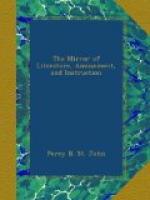at length it seemed to occupy the whole horizon.”
On his landing he is pestered with questions from
the natives; but, thanks to the Hamiltonian system,
“Popanilla, under these circumstances, was more
loquacious than could have been Capt. Parry.”
He announces himself as the “most injured of
human beings;” the women weep, the men shake
hands with him, and all the boys huzza: he then
narrates his ill-fortunes at Fantaisie, not forgetting
the never-enough-to-be-lamented lock of hair.
Other danger awaits him, for “to be strangled
was not much better than to be starved; and certainly
with half a dozen highly respectable females clinging
round his neck, he was not reminded, for the first
time in his life, what a domestic bowstring is an
affectionate woman.” He is next joined
by an “influential personage,” who informs
him that he is in
Hubbabub (London)—the
largest city, not only that exists, but that ever did
exist, and the capital of the Island of
Vraibleusia,
the most famous island, not only that is known, but
that ever was known. “He provides himself
with a purse, and exchanges his money with a banker,
who offers him during his stay in Vraibleusia, the
use of a couple of equipages, a villa, an opera box;
insists upon sending to his hotel some pineapples
and very rare wine; and gives him a perpetual ticket
to his picture-gallery.” Popanilla leaves
his gold and takes the banker’s pink shells,
for “no genteel person has ever anything else
in his pocket.” Then follow some quips
on the shell question (currency), and Mr. Secretary
Perriwinkle, the most eminent conchologist, and the
“debt” of the richest nation in the world;
although, “a golden pyramid, with a base as
big as the whole earth and an apex touching the heavens,
would not supply sufficient metal to satisfy the creditors.”
“The annual interest upon our debt exceeds the
whole wealth of the rest of the world; therefore we
must be the richest nation in the world.”
[Footnote 10: “What boots it thee to call
thyself a sun.”]
Our traveller being now settled at a splendid hotel
in Hubbabub, Skindeep, his “gentleman in black,”
drives him about the city in an elegant equipage.
The western migrations of fashion are humorously sketched,
and the architecture of our metropolis comes in for
a share of the author’s banter. “In
general, the massy Egyptian appropriately graced the
attic stories; while the finer and more elaborate
architecture of Corinth was placed on a level with
the eye, so that its beauties might be more easily
discovered. Spacious colonnades were flanked
by porticoes, surmounted by domes; nor was the number
of columns at all limited, for you occasionally met
with porticoes of two tiers, the lower one of which
consisted of three, the higher one of thirty columns.
Pedestals of the purest Ionic Gothic, were ingeniously
mixed with Palladian pediments; and the surging spire
exquisitely harmonized with the horizontal architecture
of the ancients. But, perhaps, after all, the
most charming effect was produced by the pyramids,
surmounted by weathercocks.”




